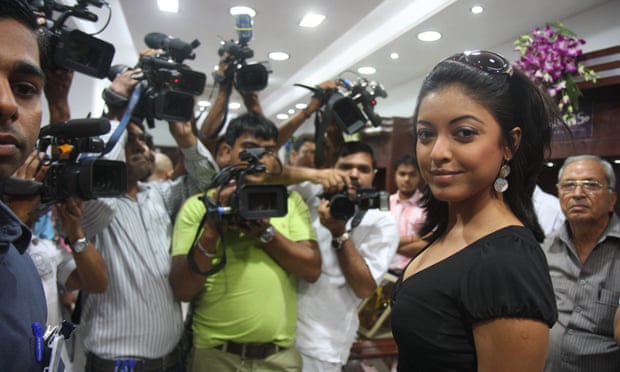- UID
- 20
- Online time
- Hours
- Posts
- Reg time
- 24-8-2017
- Last login
- 1-1-1970
|
With the resignation of a cabinet minister, our #MeToo movement has claimed its first victory – but the battle continues.

‘Women are saying they won’t be told to shut up like their predecessors.’ Tanushree Dutta in 2008, before she left India. Photograph: Hindustan Times/Getty Images
▼ Last year, just as the world was reading with disgust stories emerging as a result of the #MeToo movementin the US, a journalist from Bengaluru decided to tell her storyin Vogue India. She wrote a detailed, graphic account of harassment by a senior editor and founder of two national newspapers who had invited her for an interview. But Priya Ramani stopped short of naming her alleged tormentor.
For Indian women, the courage to identify a man in power does not come easily. In a culture where sexual harassment is normalised and trivialised, where the line of consent is blurred by the patriarchy and flawed ideas of machismo, where a women’s testimony is too often disregarded, it took an external force, in the form of #MeToo, for Ramani and other women to feel as though they could call out their alleged tormentors. But they were still fearful.India is being cleansed of the toxic male entitlement that has long been glamorised in our arts and popular culture
Now, a year on, it feels as though the momentum has returned. This month, Ramani finally namedthe unknown editor. It was Mobashar Jawed Akbar. He had left journalism to join the ruling Bharatiya Janata party (BJP), and had been inducted in the country’s cabinet as the minister of state for external affairs in 2016.
Within days of Ramani’s allegation, more than 20 female journalistsaccused Akbar of molestation, with complaints including forcible kissing and groping. Every day a harrowing account of harassment by Akbar found its way on to social media under the #MeToo hashtag.
The government, led by the prime minister Narendra Modi– who assumed power in 2014 on the promise of providing a safe and just environment for women – remained silent. So did an entire cabinet of ministers.
Emboldened, Akbar filed a defamation case against Ramani, hiring a battery of the best lawyers in the country. But, by that time, Ramani had the support of thousands of women who had found their voices, shaming the Indian government over its lack of a response. On 16 October, Akbar, who continues to deny the allegations, stepped downfrom his post. Indian women celebrated the first concrete victory of their own #MeToo movement. (▪ ▪ ▪)
► Please, read the full note here: Source |
|